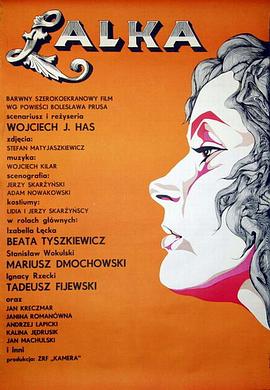『 平淡历史 』
“ 改编自契诃夫的小说札记《没意思的故事》,电影主要讲述教授尼古拉得了神经衰弱症之后行为举止心理轨迹变化的故事,前半部分印象深刻的是拒绝给学生做毕业论文,后半部分则...
| 演员 | Marek Bargielowski / Wladyslaw Dewoyno |
| 导演 | Wojciech Has |
| 地区 | 其它 |
| 语言 | 其它 |
| 类型 | 剧情片 |
| 豆瓣 | 7.5 |
| 年份 | 1983 |
| 更新 | 2023-03-26 |
相关影视推荐
颠倒黑白
阿加塔·布泽克,克里斯提娜·杨达,安娜·波洛尼,马辛·多洛辛斯基,亚当·沃诺维茨,布罗尼斯拉夫瓦格拉斯基,Lukasz Konopka,Blazej Wójcik,Jerzy Bonczak,Jacek Poniedzialek,Joachim Lamza,Olena Leonenko,马雷克·普罗博什,克拉拉·比拉瓦卡,Agata Zalecka,格泽戈兹·伊曼纽尔,Krystyna Tkacz,Wojciech Skibinski,Maciej Dancewicz,Jerzy Moes,Jolanta
萨宾娜30岁了,她的母亲和祖母都试着为她寻找结婚对象却未果。有一天,她遇见了一位酷似电影明星的年轻男子,并对他产生了兴趣。他的出现惊喜连连,使三位女性的生活发生了变化…… A story about women, set in the present and in 1950s Warsaw. The main character is Sabina, a quiet, shy woman who has just turned thirty. Clearly, she lacks a man in her life. Her mother knows all about it and tries at all costs to find her daughter a good candidate for a husband. The whole situation is controlled by the grandmother, an eccentric lady with a sharp tongue from whom no secret can be concealed. Successive admirers arrive at the pre-war tenement where the women live, but Sabina is interested in none of them. One day, appearing out of nowhere, comes the charming, intelligent, and terribly good-looking Bronislaw. His presence will spark off a series of unexpected events revealing the darker side of the women's nature. Written by Warsaw Film Festival 本片是导演Borys Lankosz的故事长片处女作,也是纪录片导演Lankosz首次拍剧情片。该片是击败了《商场女孩》和《疯人院》两部电影获得的参加奥斯卡最佳外语片角逐的机会。
玩偶1968
马里乌什·德莫霍夫斯基,贝娅塔·蒂希基维茨,菲耶夫斯基·塔德乌什,Jadwiga Gall,维斯拉夫·格拉斯,卡里娜·谢鲁斯克,Jan Koecher,扬·克雷奇马尔,塔德乌什·孔德拉特,Halina Kwiatkowska,安杰伊·瓦皮茨基,扬·马休斯基,Józef Pieracki,Janina Romanówna,Anna Seniuk,Irena Szramowska,Wladyslaw Dewoyno,卢德维克·伯努瓦,克雷斯蒂娜.费尔德曼,Aleksander Fogiel,Andrzej H
The Doll is an adaptation of the novel, The Doll (novel) by Bolesław Prus, which is regarded by many as one of the finest Polish novels ever written and, along with Pharaoh (novel), made Bolesław Prus a potential candidate for the Nobel Prize in literature. The influence of Émile Zola is evident, and some have compared the novel to Madame Bovary by Gustave Flaubert; both were Prus's contemporaries. The movie, however, may be more compared to Stendhal's Le Rouge et le Noir, (The Red and the Black). The Doll constitutes a panorama of life in Warsaw between 1878 and 1879, and at the same time is a subtle story of three generations of Polish idealists, their psychological complications, their involvement in the history of the nineteenth century, social dramas, moral problems and the experience of tragic existence. At the same time this story describes the disintegration of social relationships and the growing separation of a society whose aristocratic elite spreads the models of vanity and idleness. In the bad air of a backward country, anti-Semitic ideas are born, valuable individuals meet obstacles on their way, and scoundrels are successful. This poetic love story follows a nouveau riche merchant, Stanislaw Wokulski, through a series of trials and tribulations occasioned by his obsessive passion for an aristocratic beauty, Izabela Lecka, played by the famous Polish actress, Beata Tyszkiewicz. Plot: As a descendant of an impoverished Polish noble family, young Wokulski is forced to work as a waiter at Hopfer's, a Warsaw restaurant, while dreaming of a life in science. After taking part in the failed 1863 Uprising against Tsarist Russia, he is sentenced to exile in Siberia. On eventual return to Warsaw, he becomes a salesman at Mincel's haberdashery. Marrying the late owner's widow (who eventually dies), he comes into money and uses it to set up a partnership with a Russian merchant he had met while in exile. The two merchants go to Bulgaria during the Russo-Turkish War of 1877-78, and Wokulski makes a fortune supplying the Russian Army. The enterprising Wokulski now proves a romantic at heart, falling in love with Izabela, daughter of the vacuous, bankrupt aristocrat, Tomasz Łęcki. In his quest to win Izabela, Wokulski begins frequenting theatres and aristocratic salons; and to help her financially distressed father, founds a company and sets the aristocrats up as shareholders in his business.The indolence of these aristocrats, who secure with their pensions, are too lazy to undertake new business risks, frustrates Wokulski. His ability to make money is respected but his lack of family and social rank is condescended to. Because of his "help" (in secret) to Izabela's impecunious but influential father, the girl becomes aware of his affection. In the end she consents to accept him, but without true devotion or love.(wikipedia)
三百英里天堂
Rafal Zimowski,Wojciech Klata,Kama Kowalewska
Based on a true story dating back to 1985 when two Polish boys, a teenager and his little brother, escaped from communist Poland all the way to Sweden, hidden under a truck. In the movie, their destination has been changed to Denmark.
砂制时镜下的疗养院
扬·诺维茨基,塔德乌什·孔德拉特,伊雷娜·奥斯卡,哈利娜·科瓦尔斯卡,格斯塔·霍洛贝克,Mieczyslaw Voit,博泽娜·阿达梅克,卢德维克·伯努瓦,Henryk Boukolowski,Seweryn Dalecki,Julian Jabczynski,Jerzy Przybylski,维克托·萨德茨基,Janina Sokolowska,Wojciech Standello,塔德乌斯·施密特,Szymon Szurmiej,Jan Szurmiej,Michal Szwejlich,Pawel
哈斯的彩色电影,《萨拉戈萨手稿》的姊妹篇,个人觉得他的风格更适合彩色,此片要比《萨》更为出色。这是一次内心的历险。故事背景设在二战前期,一位年轻人乘坐一辆奇怪的列车去看望住在疗养院中垂死的父亲。但这个即将拆毁的地方唤起了他许多过去的回忆。他被过去的士兵、殖民地的雇佣兵、昔日生活中的女孩,以及他的父母所包围... 获奖:波兰电影奖最佳产品设计奖 戛纳电影节评审团奖并提名金棕榈
带着魔术盒的男人
欧嘉·博拉茨,彼得·波拉克,塞巴斯蒂安·斯坦齐维兹,海伦娜·诺罗维茨,沃伊切赫·杰林斯基,巴特洛米耶·菲莱特,Bartosz Cao,Anna Konieczna,阿加塔·布泽克,阿尔卡迪乌什·雅库比克,博格丹·科卡,Roma Kox,巴托斯·比莱尼亚,Bartosz Adamczyk,Kamil Tolinski,莫迪斯特·鲁辛斯基,Marcin Sitek,Wojciech Michalak,格泽戈兹·伊曼纽尔,卡西亚·克莫泽克
2030是个智能的时代,每个人身上都被植入了智能芯片。男主角克日什托夫曾是天才级教授工程师最亲来的助理,却在被植入智能芯片后失去了部分记忆,以新的身份“亚当”在一幢办公室里担任清洁工。有一天,他发现一个陈旧的电视机,这就是所谓的“魔术盒”,这将他与一位叫戈里娅的女人联系起来……
365天:今时之欲
米凯莱·莫罗尼,安娜·玛丽亚·西克拉克,西蒙·苏西纳,玛格达莱娜·朗帕斯卡,欧塔萨拉利泽,卡米尔·雷米泽斯基,罗伯特·瓦比奇,Oliwia Babuska,Nikola Bogucka,Rebecca Casiraghi,Natalia Cicherska,Szymon Faracik,Dominik Gawronski,Dariusz Kaliszuk,Tamer Karabay,Natalia Karpinska,Wojciech Rokita
劳拉和马西莫归来,而且比以往任何时候都要热辣。这对情侣久别重逢,但两人的新开始却因马西莫的家庭关系和一名神秘男子而变得十分复杂。为进入劳拉的生活以获取她的芳心和信任,这个神秘男子将不惜一切代价。
恶梦1979
Piotr Lysak,托马斯.哈兹克,汉娜·斯卡尔赞卡,Maria Chwalibóg,Teresa Marczewska,Bronislaw Pawlik
影片讲述一个波兰小男孩被父母送进严酷的寄宿学校,在那里受到了人性的压抑和诱惑并逐渐成长成一个具有反叛精神和独立思想的激进诗人。影片背景设置在一战以前,那时波兰这个国家还不存在,而是受到了奥匈帝国和俄国双重的统治,导演也借此片反映出自己祖国的黑暗历史。1979年圣塞巴斯蒂安电影节OCIC奖。
驴叫
桑德拉·德拉兹马尔斯卡,伊莎贝尔·于佩尔,洛伦佐·祖佐洛,马太乌兹·科西基维奇,Tomasz Organek,洛丽塔·夏马,Agata Sasinowska,Anna Rokita,Michal Przybyslawski,Gloria Iradukunda,Piotr Szaja,Aleksander Janiszewski,Delfina Wilkonska,Andrzej Szeremeta,Wojciech Andrzejuk,Waldemar Barwinski
伊欧最初是待在一支巡回表演的马戏团,那是它从小到大唯一的归属,后来它被迫离开,跋涉在波兰和意大利交界的乡间时又逃走,既遭受到残酷的状况,也遭遇到温暖的情况,而在这一路当中,它观察到人性的愚蠢和胜利。在伊欧的旅途中,它同时受到各种人物的帮助和阻碍,包括年轻的意大利牧师 (洛伦佐·祖佐洛 饰) 、女伯爵 (伊莎贝尔·于佩尔 饰) 及喧闹的波兰足球队等。
海盗夺金冠
沃尔特·马修,克里斯·康皮翁,达米安·托马斯,费迪·梅恩,大卫·凯利,东尼·派克,安东尼·道森,Jacques Maury,罗伯特·多宁,Emilio Fernandez,Wladyslaw Komar,理查德·皮尔森,夏洛特·里维斯,大卫·福克斯,Eugeniusz Priwieziencew,罗杰·阿什顿-格里菲斯,伊安·杜利,比尔·斯图尔特,西德尼·布罗姆利,卡迪尤·鲁宾逊,罗伊·金尼尔,丹尼尔·埃米尔福克,Carole Fredericks,迈克尔·埃尔菲克,比尔·弗雷泽,安东尼奥·斯波莱蒂尼,贝
惊险的海盗夺金故事,浪荡的谐趣,均被波兰斯基凌厉精妙的手法传奇般复活。影片讲述为了抢夺金冠,海盗们与西班牙官员展开了一次又一次的战斗。兜兜转转之间,原来一切又似乎回到了原点。
以规则之名
赛巴斯汀·法比杰斯基,马辛·多洛辛斯基,沃伊切赫·杰林斯基,博古斯瓦夫·林达,采扎里·帕祖拉,阿尔卡迪乌什·雅库比克,米罗斯洛·巴卡,托马斯·舒查特,亚特·祖米卓斯基,让·弗里兹
Franz Maurer is released after 25 years in prison and finds a completely changed Poland.
卡车司机之歌
Ivan Balis,Marek Bezousek,Jirí Bábek,Jan Gec,Eva Gregánová,Robo Grigorov,Ján Hangoni,米罗斯拉夫·霍卢布,Miroslav Igaz,薇尔玛·亚姆尼茨卡,Edo Krajcír,弗拉迪米尔·克拉蒂纳,费迪南德·克鲁塔,奥德·马利,Denisa Mathielighová,西尔薇·图尔博娃,埃娃·韦梅尔科娃,斯拉沃·扎赫拉德尼克
斯洛伐克影史上傳奇性的代表作之一。導演杜珊哈波斯藉由這部影片描述城市中年輕男女的悲喜生活。這些年輕人必須面對真實人生,並學習浪漫愛情有時可能也會帶來傷害。本片雖然歷史悠久,但是片中音樂氣氛的營造讓本片在斯洛伐克影史上佔有一席之地。
风信子之恋
托马斯·兹代克,Hubert Milkowski,马克·卡利塔,Adrianna Chlebicka,托马斯·舒查特,塞巴斯蒂安·斯坦齐维兹,Jacek Poniedzialek,Piotr Trojan,阿格涅丝卡萨奇沃拉,托马斯·洛索,米洛斯拉夫·兹布罗邹维奇,Andrzej Klak,Adam Cywka,Jakub Wieczorek,Filip Perkowski,Michal Pawlik,Michal Wierzbicki,Michal Balicki,Mateusz Korsak,Slaw
在1985年至1987年间,波兰安全局展开了一个名为“风信子”的秘密行动,追踪和羁押境内的男同性恋者。约有1.1万人被录入数据库,他们在以后陆陆续续受到威胁和勒索。而这一切都肇始于一桩扑朔迷离的谋杀案。 一名富商在别墅被杀,追凶过程却迷雾重重。男主角罗伯特是一个愣头青小警察,虽然老爸是总警监,他却见不得裙带关系,而且对破案异常较真,希望能查出背后的真相。罗伯特瞒着未婚妻去男同性恋圈子卧底,认识了外向的男大学生艾瑞克。 艾瑞克是一名大胆而自信的年轻人,接受过西化教育。他对罗伯特天然的信赖,向后者抱怨风信子行动的卑鄙,并且透露了一些跟谋杀案有关的内情。感受到伙伴的内心压抑后,艾瑞克对罗伯特说做人不能什么都害怕,尤其不能害怕自由... 罗伯特随着调查深入,他发现富商背后有一个庞大的金钱性爱网络,而对艾瑞克的迷恋给他惹来了杀身之祸...




















